Related Research Articles
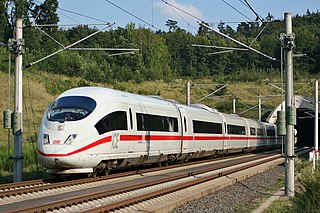
Intercity Express is a high-speed rail system in Germany. It also serves destinations in Austria, France, Belgium, Switzerland and the Netherlands as part of cross-border services. It is the flagship of the German state railway, Deutsche Bahn. ICE fares are fixed for station-to-station connections, on the grounds that the trains have a higher level of comfort. Travelling at speeds up to 300 km/h (190 mph) within Germany and 320 km/h (200 mph) when in France, they are aimed at business travellers and long-distance commuters and marketed by Deutsche Bahn as an alternative to flights.
The German orthography reform of 1996 was a change to German spelling and punctuation that was intended to simplify German orthography and thus to make it easier to learn, without substantially changing the rules familiar to users of the language.

Fondue is a Swiss dish of melted cheese and wine served in a communal pot over a portable stove heated with a candle or spirit lamp, and eaten by dipping bread and sometimes vegetables or other foods into the cheese using long-stemmed forks. It was promoted as a Swiss national dish by the Swiss Cheese Union in the 1930s, and was popularized in North America in the 1960s.

The German Wikipedia is the German-language edition of Wikipedia, a free and publicly editable online encyclopedia.

Labskaus is a culinary speciality from northern Germany and in particular from the cities of Bremen, Hamburg, and Lübeck. The main ingredients are salted meat or corned beef, potatoes, and onion. Some recipes put beetroot, pickled gherkin, or even herring into it, while others have these ingredients as side dishes.
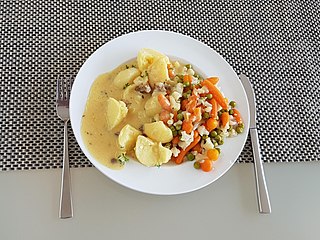
Leipziger Allerlei is a regional German vegetable dish that may be served as a main or side course. It is named after the city of Leipzig and consists of a mixture of various vegetables such as young peas, carrots, green beans, asparagus heads, morels, and celery. Cauliflower and kohlrabi are often added; occasionally onions are used too. There are numerous variations to the basic recipe.
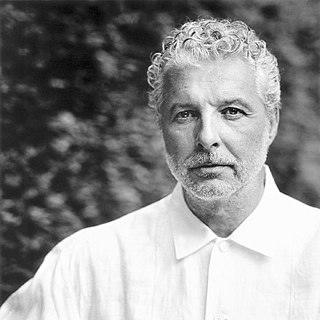
Franz André Heller is an Austrian artist, author, poet, singer, songwriter, and actor.

The German laws regulating alcohol use and sale are mostly focused on youth protection. In contrast to many other countries, legislation is relatively lenient and not designed to keep young people away from alcohol, but rather intended to teach them an appropriate approach to alcohol consumption, which is reflected by one of the lowest drinking ages in the world.

Wine tasting is the sensory examination and evaluation of wine. While the practice of wine tasting is as ancient as its production, a more formalized methodology has slowly become established from the 14th century onward. Modern, professional wine tasters use a constantly evolving specialized terminology which is used to describe the range of perceived flavors, aromas and general characteristics of a wine. More informal, recreational tasting may use similar terminology, usually involving a much less analytical process for a more general, personal appreciation.
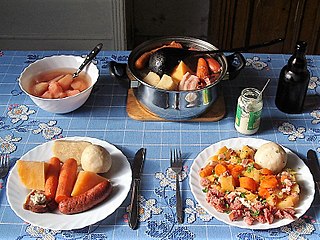
Steckrübeneintopf is a German dish that, today, is especially common in North Germany. It generally consists of a stew made from swede, carrots and potatoes in varying proportions and diverse, usually smoked or pickled, types of meat or sausage. Occasionally special cooking pears used as well. The stew may be seasoned and refined with salt, pepper, mustard, horseradish, celery, leeks or parsley, etc., according to taste.
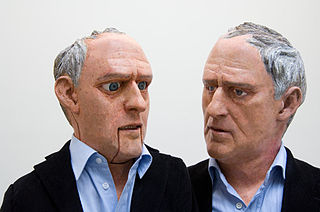
Stephan Huber is a German sculptor and object artist.

Abel Seyler was a Swiss-born theatre director and former merchant banker, who was regarded as one of the great theatre principals of 18th century Europe. He played a pivotal role in the development of German theatre and opera, and was considered "the leading patron of German theatre" in his lifetime. He supported the development of new works and experimental productions, helping to establish Hamburg as a center of theatrical innovation and to establish a publicly funded theater system in Germany. Working with some of Germany's foremost actors and playwrights of his era, he is credited with pioneering a new more realist style of acting, introducing Shakespeare to a German language audience, and with promoting the concept of a national theatre in the tradition of Ludvig Holberg, the Sturm und Drang playwrights, and serious German opera, becoming the "primary agent for change in the German opera scene" in the late 18th century. Already in his lifetime, he was described as "one of German art's most meritorious men."

Eduard Zuckmayer was a German music educator, composer, conductor and pianist. He was the older brother of the famous German writer Carl Zuckmayer (1896–1977).
Rudolf Sellner, born Gustav Rudolf Sellner was a German actor, dramaturge, stage director, and intendant. He represented in the 1950s a radical Instrumentales Theater. After decades of acting and directing plays, he turned to staging operas, and was a long-time intendant of the Deutsche Oper Berlin from 1961, when the Berlin Wall was built. He staged notable world premieres, including Ernst Barlach's play Der Graf von Ratzeburg in 1951, Ionesco's Mörder ohne Bezahlung in 1958, Giselher Klebe's Alkmene in 1961 for the opening of the Deutsche Oper, and Aribert Reimann's opera Melusine in 1971.
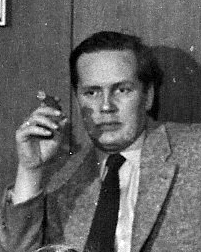
Roland Gööck (1923–1991) was a German editor and non-fiction author who, from 1954, was in charge of the publisher Bertelsmann.
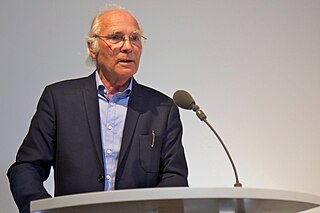
Helmut Bley is a German historian. He is professor emeritus for modern and African history at the historical seminar of the Leibniz University Hannover.

Beuschel is a dish that is typically a ragout made from lungs and other organs, such as heart, kidneys, spleen, and tongue, from calf, beef, pork, or game. It is often served with a sour cream sauce and bread dumplings. It is a dish of Viennese cuisine but is widespread in all of Austria, Bavaria, and Bohemia.

Slata Roschal, also known as Slata Kozakova, is a German writer and literary scholar.
References
- ↑ "Australiens Aborigines : Ende der Traumzeit / Eckhard Supp". Australian Institute of Aboriginal and Torres Strait Islander Studies.